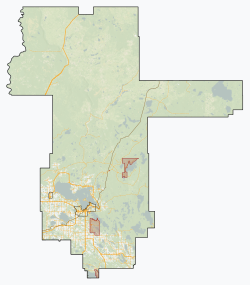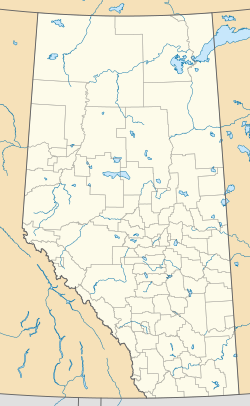
Plamondon, Alberta

Plamondon | |
|---|---|
| Coordinates: 54°50′59″N 112°20′31″W / 54.8497°N 112.3419°W | |
| Country | Canada |
| Province | Alberta |
| Census division | No. 12 |
| Municipal district | Lac La Biche County |
| Settled | 1905 |
| Government | |
| • Type | Unincorporated |
| • Mayor | Omer Moghrabi |
| • Governing body | Lac La Biche County Council
|
| Area (2021)[1] | |
| • Land | 9.65 km2 (3.73 sq mi) |
| Elevation | 555 m (1,821 ft) |
| Population (2021)[2] | |
• Total | 501 |
| Time zone | UTC−7 (MST) |
| • Summer (DST) | UTC−6 (MDT) |
| Forward sortation area | |
| Area code(s) | 780, 587, 825 |
| Highways | Highway 858 |
Plamondon is a hamlet in northern Alberta, Canada within Lac La Biche County.[3] It is located on Highway 858, approximately 3.0 km (1.9 mi) north of Highway 55, and has an elevation of 555 m (1,821 ft).

The hamlet is located in Census Division No. 12 and in the federal riding of Fort McMurray—Cold Lake.

History
The community was founded by Joseph Plamondon in 1908 and settled by primarily French-American and French Canadian pioneers. Most of the families that eventually settled there came from Provemont, Michigan (now Lake Leelanau in Leelanau County, Michigan) and from French-speaking areas of Ontario. This is mentioned in a 1991 interview with Cecelia Bussey.[4]

North of Plamondon is Rossian. Rossian is a community of Old Believers (Old Ritualists), a Traditionalist Russian Orthodox sect whose ancestors broke from the Church after Patriarch Nikon's reforms.[citation needed] The Great Schism of 1666, or Raskol, resulted over reforms in church ritual and translation intended to better align the practices of the Russian Church with Greek Orthodox practices.[citation needed] The Old Believers that live outside Plamondon are bezpopovtsy, or Priestless Old Believers, who believe that apostolic succession ended with Nikon's apostasy and therefore have no clergy and refuse the Eucharist.[citation needed] Most of these families moved to the area in the mid 1970s from Woodburn, Oregon, which is also home to a large Old Believer community.[citation needed] Many also came from Xinjiang, China, by way of New Zealand, where they fled after the Russian Revolution and the Chinese Communist Revolution.[citation needed]

Demographics
In the 2021 Census of Population conducted by Statistics Canada, Plamondon had a population of 501 living in 195 of its 230 total private dwellings, a change of 20.4% from its 2016 population of 416. With a land area of 9.65 km2 (3.73 sq mi), it had a population density of 51.9/km2 (134.5/sq mi) in 2021.[2][1]

As a designated place in the 2016 Census of Population conducted by Statistics Canada, Plamondon had a population of 348 living in 136 of its 172 total private dwellings, a change of 0.9% from its 2011 population of 345. With a land area of 1.96 km2 (0.76 sq mi), it had a population density of 177.6/km2 (459.9/sq mi) in 2016.[5]

Lac La Biche County's 2016 municipal census counted a population of 348 in Plamondon,[6] a 1.2% change from the hamlet's 2013 municipal census population of 344.[7]

Plamondon is also home for a sizable community of Russian Orthodox Old Believers.

Economy
The main industries in the region are logging and farming.

Amenities
The community has two schools, Ecole Beausejour and Ecole Plamondon School, which draw students from the entire region. École Plamondon School, offers English, French immersion, and Russian classes. École Beausejour is a francophone school, with instruction surrounding with the francophone culture.

There are two hotels, two banks, post office, indoor hockey arena with artificial ice, a museum, and a rather large church.

The hamlet also holds an annual French hockey tournament called Hockey en Fête. Frontenacs of University of Alberta have won twice. A Canadian Mud Racing Organization (CMRO) event is also held annually at the Plamondon Mud Bog.

Notable people
- Colin Piquette, former member of the Legislative Assembly of Alberta for Athabasca-Sturgeon-Redwater
- Leo Piquette, former member of the Legislative Assembly of Alberta for Athabasca-Lac La Biche
- Clara Plamondon, Anglican bishop
- Crystal Plamondon, performing artist
See also
- List of communities in Alberta
- List of designated places in Alberta
- List of former urban municipalities in Alberta
- List of hamlets in Alberta
References
- ^ a b "Population and dwelling counts: Canada and designated places". Statistics Canada. February 9, 2022. Retrieved February 10, 2022.
- ^ a b "Population and dwelling count amendments, 2021 Census". Statistics Canada. December 1, 2023. Retrieved September 22, 2024.
- ^ "Specialized and Rural Municipalities and Their Communities" (PDF). Alberta Municipal Affairs. June 3, 2024. Retrieved June 14, 2024.
- ^ "1991.78 - 1991.78.18 | Leelanau Historical Museum".
- ^ "Population and dwelling counts, for Canada, provinces and territories, and designated places, 2016 and 2011 censuses – 100% data (Alberta)". Statistics Canada. February 8, 2017. Retrieved February 13, 2017.
- ^ "Lac La Biche County 2016 Municipal Census Report". Lac La Biche County. p. 13. Retrieved January 28, 2017.
- ^ "2013 Census Summary". Lac La Biche County. p. 6. Retrieved January 28, 2017.
See what we do next...
OR
By submitting your email or phone number, you're giving mschf permission to send you email and/or recurring marketing texts. Data rates may apply. Text stop to cancel, help for help.
Success: You're subscribed now !


